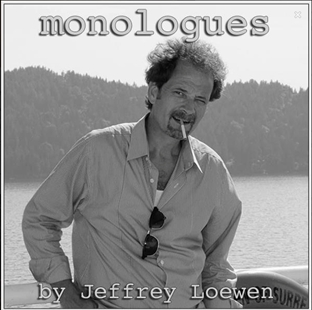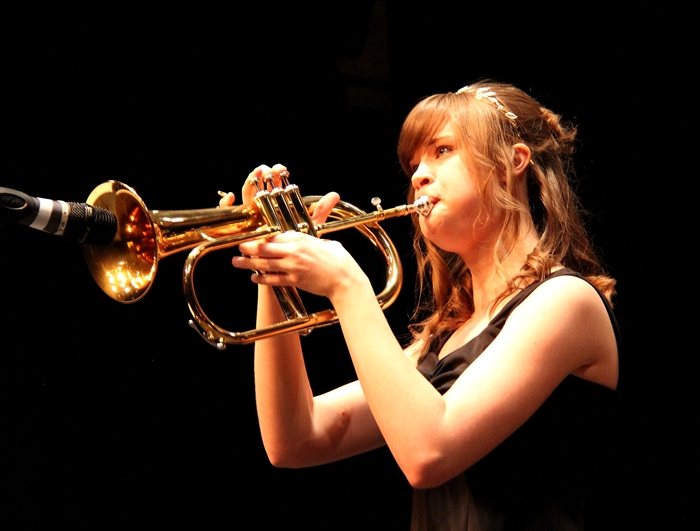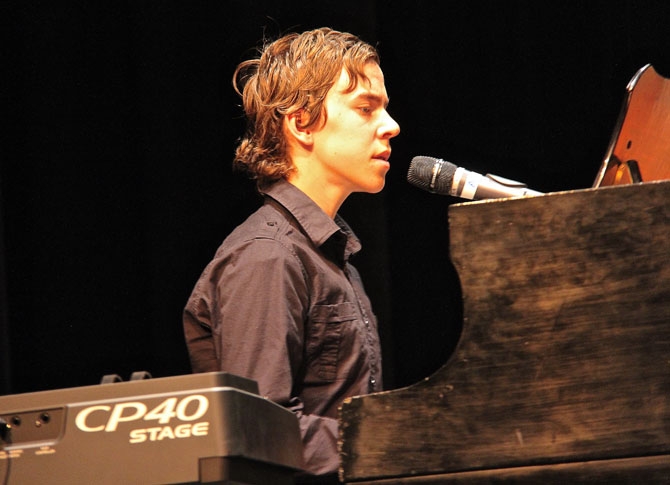
Image Credit: Compilation/Jennifer Stahn
April 22, 2015 - 8:15 AM
Readers of my weekly column will know by now that I am an inveterate slave to music.
No doubt it was my significantly older brothers, constantly spinning LPs on the rec room stereo in the early Sixties, that first made me a fan of the classic rock greats: The Beatles, The Rolling Stones, The Doors, The Guess Who, Crosby, Stills, Nash and Young, CCR....
All of these bands had a profound impact on my sponge-like musical mind, their lyrics early imprinted upon me with such force that I can still recall them with savant-like accuracy. Hell, even the engineers and producers of the music we all grooved to stick like glue to the retro-reel of my early childhood development.
Classical music, especially Beethoven (whose prized bust I had situated on the edge of our piano, glowering at me to practice harder), came to me too — in the guise of piano lessons begun at about the same time that I started school. And I loved it.
But jazz was something that wasn’t as early appreciated as the rest because I needed time to develop a sense of music history’s trajectory and discover, first through the blues, that jazz was something foundational and magnificent. Something a little more esoteric than the 12-bar basics of most blues-based rock and pop music.
I was reminded of my own development this past week, as I marveled, for three days in the darkened Kelowna Community Theatre and the Rotary Centre of the Arts, at the sophisticated musical sense and talent on display before me.
It was the 38th annual B.C. Interior Jazz Festival that had me crowding the stages, my camera in hands, my ears sharply alert. Over a thousand middle and high school students came representing jazz bands, choirs and ensembles from all over the province. And what they put on display was, in a word, transformative. For themselves, and for the rest of us in the audiences.
The Jazz Festival was also a cruel reminder of school band programmes’ evanescent nature.
You see, not everyone at the administrative and school board levels are uniformly behind the continuance of strong band programmes in our schools.
It may be news for many readers that School District 23 (which defines the territory of public schools in the Central Okanagan) is considering making some significant changes to various arts electives at the middle school level.
As early as next Fall, Rutland Middle School is expected to re-jig its grades to include grades 6 through 8; and Rutland Senior Secondary School is to cover grades 9 through 12.
At the same time, the District is exploring new approaches to their electives offerings for the students by considering making mandatory, at the grade six level, four “arts” subject areas including: Art, Music, Home Economics, and Industrial Arts. The thinking being, I suspect, that, by including every student in each of these areas, students will have a more rounded sense of the “Arts” during the tenure of their middle and high school years.
On paper, this may sound like a great thing -- after all, a kid taking home economics mandatorily might all of a sudden develop a passion for the culinary arts that she might not have had otherwise.
The trouble with the approach, however, is the relatively short duration (about 10 weeks for each subject area “explored”) of the classes. That and the suggestion that the same truncated model of pedagogy would extend throughout the balance of the middle school years after grade six.
Needless to say, if a kid gets a jones for jazz and wants to develop as a musician, pretty much any music teacher will tell you that one needs more than ten weeks to learn how to read music, let alone master even eight notes on their instrument of choice.
Extend the model further, and music teachers at the secondary level would inevitably inherit students from the middle schools without the background to truly be able to focus their efforts and achieve the kinds of results that were on display at the Jazz Festival this past week.
The threat to music education in our local public schools cannot be understated.
If the Rutland model extends to the rest of the District in the years that follow (as is suggested), one doesn’t have to be a clairvoyant to predict that future high school student-musicians might simply not have the same opportunities to excel at their chosen art, music, as today’s students have.
And that would be a cryin’ shame, in my opinion.
The relationship between excellence in school music education and excellence in other subject areas is well-documented and needn’t be reiterated here. There’s something about listening intently to fleeting bits of orchestrated-sound and reproducing them in concert with others that imparts so much that is difficult to quantify but nevertheless spiritually- and intellectually-ennobling for those that pursue a passion for music at the time in a soul’s journey when it is impressionable and truly open to artistic expression.
And that is precisely what I saw the result of this weekend. Frankly there were many moments of epiphany that your monologist experienced listening to these kids -- too many to recount here.

Ruth Pontalti
(JEFFREY LOEWEN / iNFOnews.ca)
But a look at the face of high school senior, Ruth Pontalti (cross-enrolled at both Kelowna and Mount Boucherie Secondary), burning brightly under the spotlight up front and centre at the Kelowna Community Theatre this past week, poised with a natural performer’s grace; and caressing her lovely flugelhorn, coaxing out of it mellifluous melody and emotion... Well, I can tell you all, one would have to be a zombie to remain unmoved by such an articulate young presence.
Or grade nine student, Matt Shipley, the soloist at the piano and taking on the lead vocal in the KLO Middle School choir’s rendition of Ben Folds’ poignant piece “Still Fighting It.” The song itself is a painful exploration of the difficulties of growing up. But in band director Chris Perry’s hands, with young Matt giving tender voice to this achingly beautiful piece, I must admit that I nearly succumbed to weeping and, afterwards, had to leave the theatre to regain my composure in the sun.

Matt Shipley
(JEFFREY LOEWEN / iNFOnews.ca)
In the end, it is the arts that make us human. It is the arts that lend significance to our experience in the damaged worlds we occupy. And to learn the language of the arts, especially the fleeting, insubstantial, etherial element that is Music, is something that we should be championing with vigour.
One can only hope that School Board members and School District administrators will feel the same passion that the kids do as they move forward with developing the public school curriculum.
Regrettably, although School District 23 is among the sponsors for the annual Jazz Festival, I cannot say I saw any of the board members or administrators in attendance. Which is a shame. Had they been there, I suspect they too would have been as moved as I was.
To potentially lose the focus on music in the schools will have unintended consequences for our kids and our communities for years to come. It is up to us to give voice to our values.
— Jeffrey Loewen is a Kelowna-based writer who plays music by day and politics by night.
News from © iNFOnews, 2015